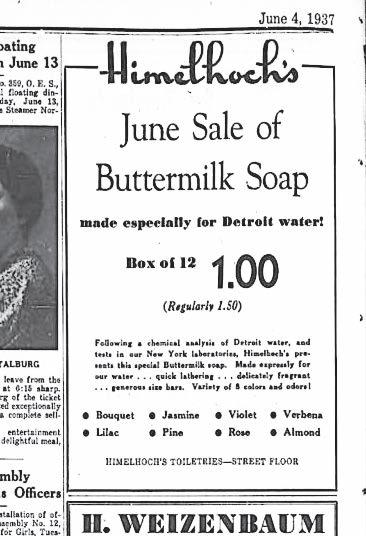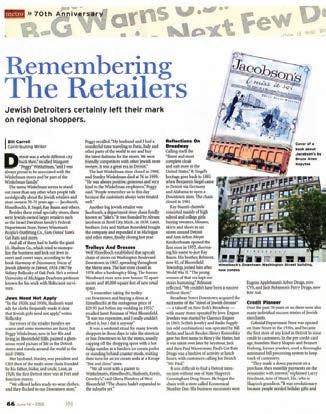
3 minute read
Looking Back
From the William Davidson Digital Archive of Jewish Detroit History accessible at www.djnfoundation.org
A Giant Name in Retail
Advertisement
Irecently read about the passing of Charles “Chuck” Himelhoch on Dec. 7, 2020. He was 101, the last son of the founder of Detroit’s famous Himelhoch’s department store. By all accounts, Charles Himelhoch was a great guy, a mensch, who worked as a stock boy, salesman, coat buyer and in other positions within the company before eventually serving three decades as its CEO. His daughter, Carol, related that he was an “idea man,” but most of all, Charles “put other people first.”
Mike Smith Charles Himelhoch’s story
Alene and Graham Landau is very interesting to me. I
Archivist Chair have reviewed thousands of historic pages of the Detroit Jewish Chronicle and the JN in the William Davidson Digital Archive of Jewish Detroit History, and I can tell you that, beginning in 1919, many issues of these publications have something in common: advertisements for Himelhoch’s.
The story of Himelhoch’s is a history of Detroit, of Jews in the city and of a Jewish family. It is also a classic history of Jewish entrepreneurship in America.
In 1873, Wolf Himelhoch and his family immigrated from Latvia, then a province of Russia, and settled in Michigan’s thumb area. There, like many early Jewish immigrants, he sold goods from a push cart between Caro and Bay City. Himelhoch opened his first store in Caro in 1876.
In 1907, the first B. Himelhoch’s in Detroit opened on Woodward Avenue, next to Hudson’s, across the street from B. Siegel’s. A few years later, as Hudson’s expanded, Himelhoch’s moved into its iconic seven-story building at 1545 Woodward. Along with B. Siegel, Alberts, Hudson’s and Winkleman’s — to name just a few stores — Himelhoch’s was one of the anchors of Downtown Detroit shopping and, nationally, a recognized leader for women’s fashion.
Himelhoch’s was a great success in Detroit. As the city expanded during the first 50 years of the 20th century, so did Himelhoch’s. In the early 1950s, the company opened branch stores in Birmingham, Grosse Pointe and in Northland Mall. Eventually, Himelhoch’s was a chain of seven stores. By now, the company also sold clothing for men and children, cosmetics and other products, including its famous “buttermilk” soap.
To say the least, Himelhoch’s was a leader. Once through the doors of the store, a shopper would find the latest trend-setting fashions, an expert sales staff and innovative retailing. Most significant, Himelhoch’s supported the work of new young designers; among them were Calvin Klein and Estee Lauder.
Sadly, as the city of Detroit lost population and experienced economic population and experienced economic decline, Himelhoch’s could not survive. The Downtown store closed in 1979. This flagship store was renovated into an apartment building that still exists today.
There is, however, a happy ending to this story. In 2018, Himelhoch’s reopened as an online retailer, managed by the fourth generation of the family, Carol Himelhoch. It still features the latest fashions, and Himelhoch’s continues to promote the work of emerging new designers from Detroit and around the world.
I love the old advertisements that I find in the Davidson Archive, for Himelhoch’s, the many hundreds of other stores and products. Here are a few ads and a good story from the June 14, 2012 JN: “Remembering the Retailers.” Fun reading.






Want to learn more? Go to the DJN Foundation archives, available for free at www.djnfoundation.org.



SHOP OUR INVENTORY ONLINE FROM THE COMFORT OF YOUR HOME WE DELIVER!




248.652.9650












